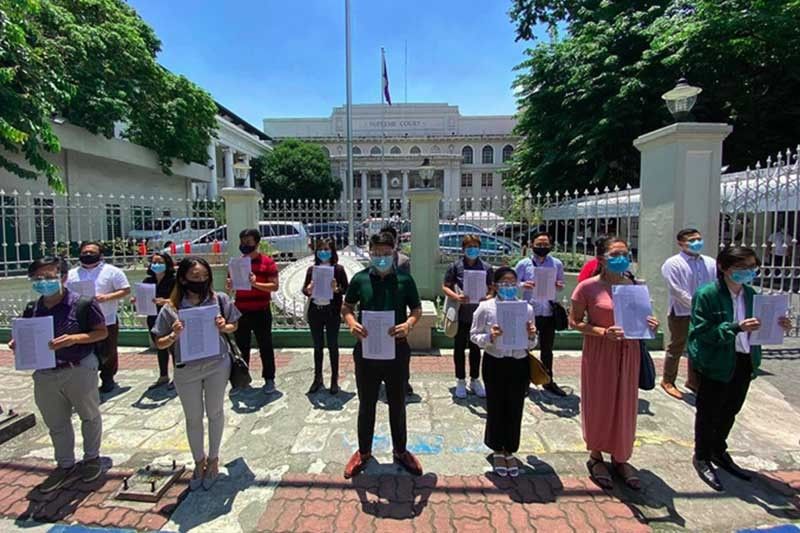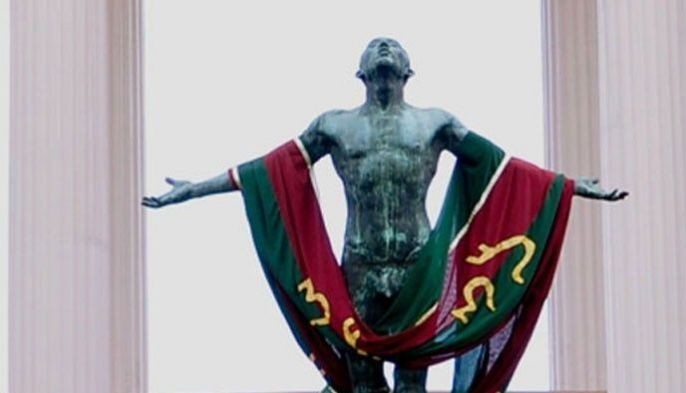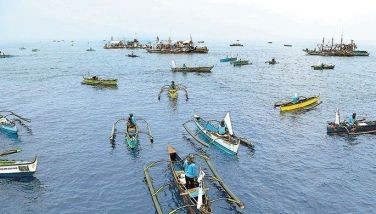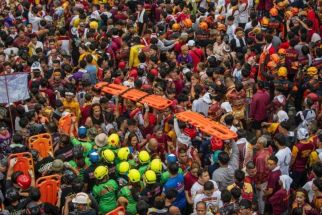Groups of Filipino youth join legal fight vs anti-terrorism law

MANILA, Philippines — The Filipino youth on Thursday joined the legal fight against the much-feared anti-terrorism law in the highest court of the land.
A total of 16 groups representing the Filipino youth, including university student councils and student groups, on Thursday filed the 14th petition of certiorari against Republic Act 11479 or the Anti-Terrorism Act of 2020 before the Supreme Court.
Inihain na sa Korte Suprema ang ika-14 na petisyon laban sa Anti-Terrorism Law na mula naman sa mga youth group at organisasyon sa University of the Philippines-Diliman, Ateneo de Manila University, De La Salle University, at University of Santo Tomas. | via @mariannenriquez pic.twitter.com/suSuL6oKZw
— News5 AKSYON (@News5AKSYON) July 23, 2020
The petitioners asked the SC to strike down as unconstitutional several parts of the anti-terrorism law that they called as the “latest attempt to use the law as a means to further suppress potential dissents and gag the Filipino people into submission.”
Like the petition filed by retired SC Justices Antonio Carpio and Conchita Carpio-Morales, and University of the Philippines law professors, they also asked that the SC set the petition for oral arguments,
“As the government chooses to instead prioritize new ways to curtail free speech and due process, Youth Petitioners are duty-bound to fight for the protection of their rights, and they are constrained to resort to the Honorable Court to seek redress, hoping—perhaps to idealistically—that their rightful qualms would be heard,” their petition read.
Lawyers Dino De Leon, who previously asked the SC to compel releasing of the president’s health bulletin and Norma Singson-De Leon serve as the lead counsel of the petitioners.
Youth most 'at-risk' in new law
As with previously filed petition, this latest legal challenge assailed the “vagueness” of Sections 4 and 9 of the law, which define acts that fall under terrorism and inciting to terrorism, respectively.
“As it is written under the Anti-Terror Law, any form of speech may possibly be punished in connection to Terrorism. In the first place, nowhere in the Anti-Terror Law does it provide any example or metric by which any person may reasonably calibrate the tendency of speech or speech-related conduct to create a serious risk,” their plea read.
The petitioners said that the vague language of Section 4 of the law leaves its interpretation to the hands of State.
“The fact that Anti-Terror Law leaves citizens, especially the youth, at risk of unknowingly violating the law in the exercise of their constitutional freedoms, especially when they are usually involved in speaking out against the abuses of the State, renders the same unconstitutional,” they added.
The petitioners raised that as the youth, their advocacy for change that is protected by the Constitution may still run the risk of being interpreted as punishable by the anti-terrorism law in the opinion of law enforcers.
Due to its vagueness, the youth, like the rest of the citizenry, “are left in a position where it would be more preferable to stay silent and avoid the exercise of constitutionally-protected speech, primarily out of fear of being subject to the overly-broad discretion of the officers.”
They implored the SC that as the youth, they actively engage in public discourse and take part in activities involving dissent—a rightful exercise of the freedom of expression, “which are at risk of prosecution under the Anti-Terror Law.”
BAYAN, NUPL file physical copy of petition
The threat of COVID-19 forced the SC to close its gates for three days for disinfection, but this did not stop petitioners from firing legal challenges against the contentious law.
Labor and peasant groups led by BAYAN and represented by the National Union of Peoples Lawyers electronically filed the 11th petition on Sunday—the first plea since the law took effect, following the Palace’s theory that it became on the 19th.
As soon as the SC opened its gates on Thursday, NUPL lawyers filed a physical copy of their petition.
"People’s liberties — even their lives — would be at the mercy of a law enforcer’s own understanding of 'terrorism'...the exercise of these rights would be held hostage by imagined threats, the kind that the current administration routinely concocts in the face of criticism, dissent or opposition to its questionable policies and odious proclivities," NUPL earlier said on their petition.
Another petition was filed on Wednesday, this time from retired Judiciary luminaries, Carpio and Carpio-Morales. They are joined by professors of UP College of Law.
The Carpios’ petition has also been physically filed Thursday morning.
President Rodrigo Duterte signed the Anti-Terrorism Law on July 3 despite opposition from rights groups and civil society groups that it could be used to stifle human rights.
A petition against the law has been filed at the Supreme Court and other groups are preparing pleadings of their own.
Follow this page for updates. Photo courtesy of The STAR/Michael Varcas
National Security Adviser Hermogenes Esperon moves to block access to several websites, including news sites of alternative news orrganizations Bulatlat.com and Pinoyweekly.org.
In his letter to the National Telecommunications Commission, he only says the websites are "affiliated to and are supporting these terrorists and terrorist organizations."
No other basis to back up his allegation was cited in the letter.
Citing the designation of the CPP-NPA-NDF as terrorists, NSA Hermogenes Esperon moves to block access to several sites.
— Kristine Patag (@kristinepatag) June 22, 2022
In Esperon's letter to the NTC, he included news sites @bulatlat and @pinoyweekly; sites of other progressive groups RMP and Save our Schools. @PhilstarNews pic.twitter.com/nAzMITJFsS
The Commission on Human Rights says it "partly welcomes" the Supreme Court decision that some parts of the controversial Anti-terrorism Law are unconstitutional.
CHR spokesperson Jacqueline de Guia says the commission remains hopeful that the remaining contentious provisions of the law will be clarified by the high cour in the full text of the decision.
"At the same time, our commitment remains in guarding against possible human rights violations arising from the implementation of the anti-terror law. We steadfastly remind the government that countering terrorism and protecting human rights are not competing values but are, in fact, mutual and complementary," De Guia says in a statement.
The Supreme Court has deliberated and voted on the controversial Anti-Terrorism Act but the decision will be released "at the soonest time possible."
"However, considering that there were numerous issues resolved in the case, as well as the fact that each Justice had to vote on each issue, there is a need to accurately confirm and tally the vote of each Justice in order to ensure the correct resolution of the Court per issue," SC spokesperson Brian Hosaka says.
The Anti-Terrorism Council designates the National Democratic Front of the Philippines, the panel that negotiates for communist rebels during peace talks a terrorist organization.
Previous designation of the Communist Party of the Philippines and New People's Army led to the designation of supposed members of the CPP's Central Committee. Among those designated as terorrists were peace consultants.
Designation gives the Anti-Terrorism Council the authority to investigate and freeze the accounts of designated persons.
The Anti-Terrorism Council has designated 29 people, including alleged members of the Communist Party of the Philippines-New People's Army, as terrorists in two resolutions.
Designation allows the Anti-Money Laundering Council to freeze the assets of those on the list.
- Latest
- Trending
































